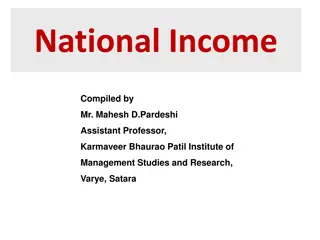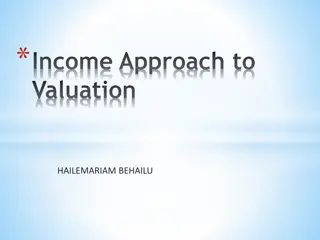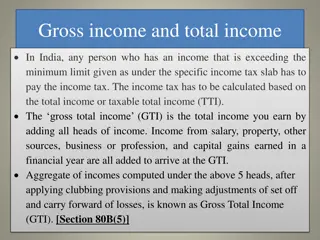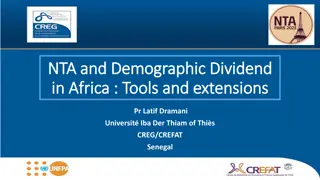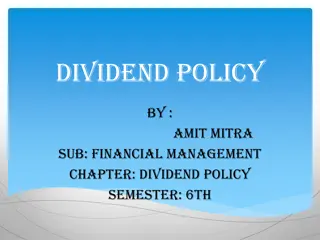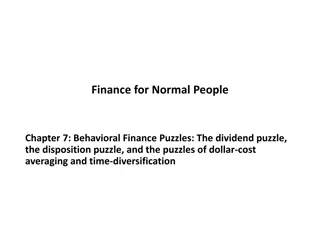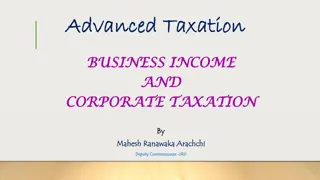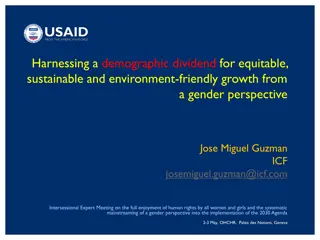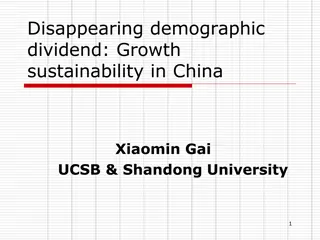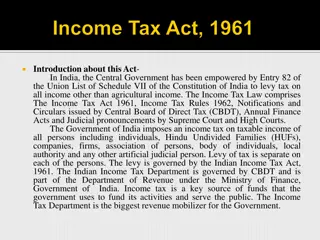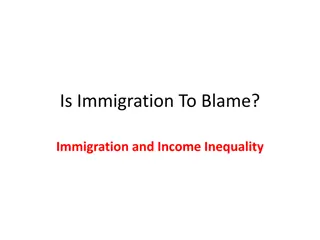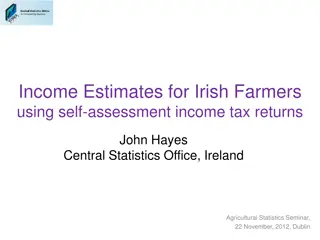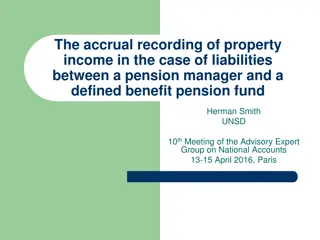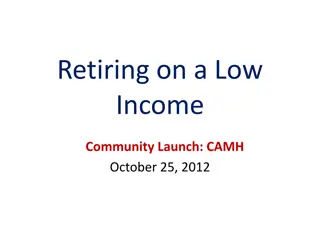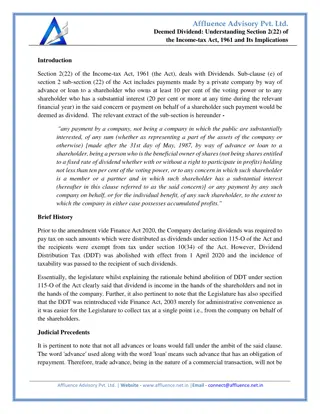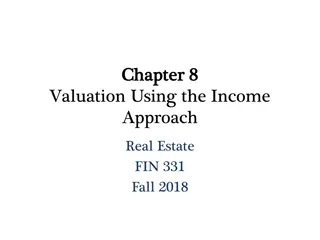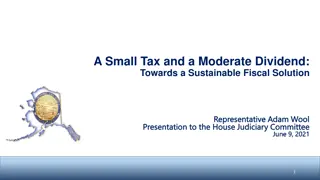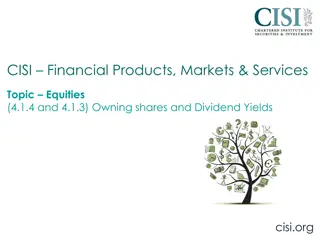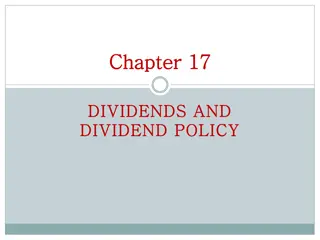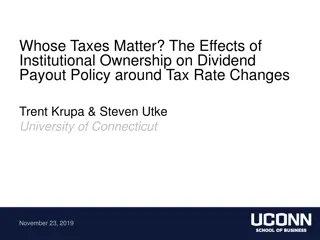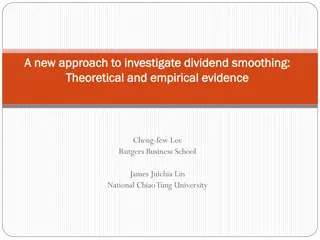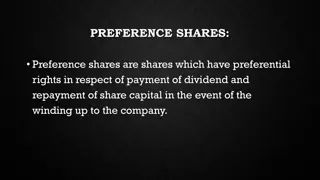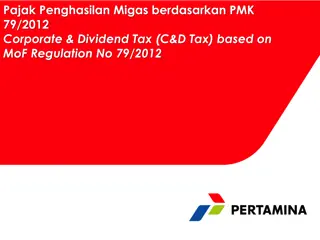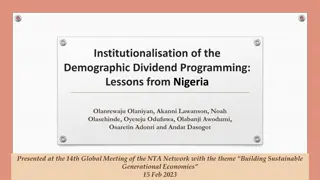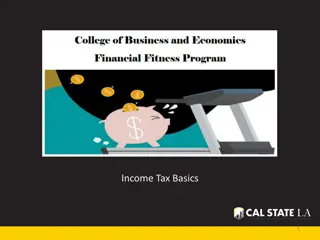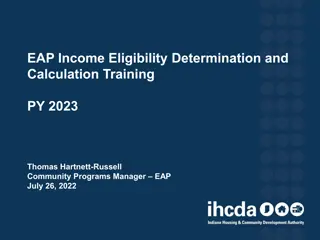Overview of Financial Management Principles
Financial management is a vital managerial process focusing on planning and controlling financial resources. Initially centered on fund collection, modern financial management emphasizes both fund collection and efficient utilization. The characteristics of the modern approach include increased emph
1 views • 7 slides
Understanding Concepts of National Income in Economics
Explore the concepts of national income presented by Dr. Rashmi Pandey, covering key indicators such as Gross National Product (GNP), Gross Domestic Product (GDP), Net National Product (NNP), Net Domestic Product (NDP), Personal Income, Disposable Income, Per Capita Income, and Real Income. Gain ins
0 views • 22 slides
Understanding National Income and Its Importance in Economics
National income is a crucial measure of the value of goods and services produced in an economy. It provides insights into economic growth, living standards, income distribution, and more. Concepts such as GDP, GNP, Personal Income, and Per Capita Income help in understanding the economic health of a
5 views • 14 slides
Understanding Redemption of Preference Shares
Redemption of preference shares involves the repayment of fixed-rate dividend-bearing shares within stipulated terms and conditions, crucial for companies to comply with company laws. Divisible and Non-Divisible Profits play key roles in facilitating the redemption process. Different types of prefer
0 views • 7 slides
Understanding the Income Approach to Property Valuation
The income approach to property valuation involves analyzing a property's capacity to generate future income as an indication of its present value. By considering income streams from rent and potential resale, commercial property owners can convert income forecasts into value estimates through proce
8 views • 49 slides
Understanding Income Tax in India: Gross vs Total Income
In India, income tax is calculated based on the total income or taxable total income. The gross total income includes earnings from all sources like salary, property, business, and capital gains. Various additions such as clubbing provisions, adjustments for losses, unexplained credits, investments,
0 views • 7 slides
Understanding Tax Obligations and Assessable Income in Australia
In Australia, residents are taxed on worldwide income while non-residents are taxed only on Australian-sourced income. The tax liability is calculated based on taxable income, tax offsets, other liabilities like Medicare levy, and PAYG credits. Assessable income includes employment income, super pen
0 views • 13 slides
Tools and Extensions for NTA and Demographic Dividend in Africa
This content discusses the tools and extensions related to National Transfer Accounts (NTA) and Demographic Dividend in Africa, focusing on quantifying domestic production, consumption, and progress in harnessing demographic dividend. It includes NTA profiles for African countries, NTTA profiles for
2 views • 10 slides
Understanding Dividend Policy and Share Repurchase in Corporate Finance
Firms in corporate finance make decisions on dividend payouts and share repurchases, impacting company value and shareholder returns. Dividends are payments to shareholders, while share repurchases involve buying back company stock. Companies can choose between these methods based on various factors
1 views • 29 slides
Understanding Dividend Policy in Financial Management
Dividend policy in financial management involves decisions regarding the distribution of earnings to shareholders and retained earnings. It includes types of dividends, time of payment, and dimensions impacting the policy. Various dividend theories like Modigliani and Miller's Model, Walter's Model,
0 views • 34 slides
Understanding Behavioral Finance Puzzles in Normal People's Finance
Behavioral finance puzzles delve into challenges like the dividend puzzle, the disposition puzzle, dollar-cost averaging, and time diversification. These puzzles combine wants for different benefits, cognitive and emotional errors, tools for correction, and implications of various theories for decis
0 views • 53 slides
Understanding Sri Lanka's Inland Revenue Act No. 24 of 2017
This content delves into the key aspects of the Inland Revenue Act No. 24 of 2017 in Sri Lanka, covering chargeability of income tax, imposition of income tax, definitions, sources of income, assessable income for residents and non-residents, income tax payable, and income tax base. It provides valu
0 views • 93 slides
Harnessing a Demographic Dividend for Equitable Growth: A Gender Perspective
Harnessing a demographic dividend involves leveraging a decrease in fertility rates to shift the population towards a larger working-age group, reducing dependency ratios and creating opportunities for economic and social investments. This process requires the right policies and frameworks. The 3 Es
0 views • 11 slides
Understanding Income from House Property in Taxation
House property income refers to rent received from properties owned by an individual, charged under income tax. It is based on the concept of annual value, representing the expected rental income or market value of the property. The annual value is taxable under the head "Income from House Property.
1 views • 12 slides
Challenges and Opportunities in China's Demographic Dividend
China's rapid economic growth was fueled by its demographic dividend, but it now faces challenges such as population aging, rising labor costs, and avoiding the middle-income trap. The country has transitioned to a "new normal" of slower growth, structural changes, and evolving growth drivers. Under
0 views • 63 slides
Overview of Income Tax Authorities in India
The Income Tax Act in India empowers the Central Government to levy taxes on all income except agricultural income. The Income Tax Department, governed by the Central Board of Direct Taxes, plays a crucial role in revenue mobilization. Understanding the functioning, powers, and limitations of tax au
0 views • 14 slides
Understanding Residuary Income and Taxable Sources
Residuary income, under section 56(1), includes all income not excluded from total income and subjected to income tax under "Income from other sources." Certain specific incomes listed in section 56(2) are taxable, such as dividends, winnings, employee contributions, interest on securities, and inco
0 views • 9 slides
Understanding Clubbing of Income in Taxation
Clubbing of income refers to including another person's income in the taxpayer's total income to prevent tax avoidance practices like transferring assets to family members. This concept is addressed in sections 60 to 64 of the Income Tax Act. Key terms include transferor, transferee, revocable trans
1 views • 16 slides
Evolution of Progressive Income Tax Systems
The concept of modern progressive income tax, developed in the early 20th century in countries like the UK, US, France, India, and Argentina, is based on the principle of a comprehensive tax base encompassing various income categories. The system involves effective vs. marginal tax rates, different
0 views • 19 slides
Exploring Immigration's Impact on Income Inequality
The presentation delves into the relationship between immigration and income inequality, analyzing data on income distributions among voters, non-voting citizens, and non-citizens in PA. It discusses the log-normal distribution as an approximation for income distribution and examines the ratio of me
0 views • 16 slides
Analysis of Irish Farmer Incomes Based on Income Tax Returns
This paper presents an analysis of Irish farmer incomes in 2010 using self-assessment income tax returns from the Revenue Commissioners. The study focused on various income sources such as trading income, rental income, employment income, social welfare transfers, and pension income. The dataset com
0 views • 12 slides
Accrual Recording of Property Income in Pension Management
The accrual recording of property income in the context of liabilities between a pension manager and a defined benefit pension fund involves accounting for differences in investment income and pension entitlements. This process aims to reflect the actual property income earned by the pension fund, c
0 views • 17 slides
Understanding Retirement Income for Low-Income Seniors in Ontario
Exploring the income system for retirees in Ontario, including Old Age Security, Canada Pension Plan, and private pensions. Addressing the concept of low income, eligibility for Guaranteed Income Supplement, and debunking common misconceptions with a top 10 list of bad retirement advice. Highlightin
0 views • 11 slides
Deemed Dividend-Understanding Section 2(22) of the Income-tax Act, 1961
Section 2(22)(e) of the Income-tax Act addresses Deemed Dividend, covering advances or loans given by private companies to shareholders with substantial interest. After the abolition of Dividend Distribution Tax (DDT) in 2020, the tax liability shift
0 views • 3 slides
Valuation Using the Income Approach in Real Estate
The income approach to appraisal in real estate involves converting future income into a present value through income capitalization. This method utilizes direct capitalization and discounted cash flow techniques to estimate property value based on net operating income. Estimating net operating inco
0 views • 17 slides
Understanding Taxation in Australia: Income Declaration and Assessment
Australian taxation laws require residents to declare worldwide income while non-residents are taxed on Australian-sourced income. The tax liability calculation involves taxable income, tax offsets, other liabilities such as Medicare levy, and PAYG credits. Assessable income includes various sources
0 views • 13 slides
Towards a Sustainable Fiscal Solution: A Small Tax and a Moderate Dividend
Alaska's fiscal challenges post-2014 oil price collapse led to budget cuts and restructuring of Permanent Fund earnings. Representative Adam Wool's proposal aims to balance the budget by adjusting the dividend formula and introducing new revenues through a small tax. The Ways and Means Committee exp
0 views • 24 slides
Understanding Share Ownership and Dividend Yields in Equities
Owners of shares in companies receive dividend yields as part of their investment return, which are typically paid annually. Shareholders also benefit from perks like voting rights and trade discounts. However, there are risks involved, such as difficulties in selling shares at a reasonable price an
0 views • 7 slides
Understanding Dividend Income, Trade, Business, and Professions
Dividend income is a share of profits distributed by a company to its shareholders in the form of money, shares, debentures, or other securities. Dividends are subject to tax, with resident companies typically paying a 10% tax on gross dividends. Certain exemptions apply for specific entities and si
0 views • 22 slides
Understanding Dividends and Dividend Policy in Finance
Explore the significance of cash dividends, dividend forms, dividend payments, and the impact of dividend policy on a company's stock value. Learn how dividend policy decisions can affect shareholders and the firm's growth potential. Understand concepts like low payout benefits and high payout consi
0 views • 12 slides
Effects of Institutional Ownership on Dividend Payout Policy
This study examines how a firm's ownership structure, particularly institutional ownership, influences its dividend policy around tax rate changes. It explores the impact of tax-sensitive/insensitive institutional ownership, the role of dedicated institutions as monitors, and the interaction between
1 views • 26 slides
Understanding Dividend Policy in Financial Management
Dividend policy plays a critical role in balancing long-term financing and shareholder wealth. It involves determining the distribution of profits among shareholders while retaining earnings for company growth. Approaches like Long Term Financing and Wealth Maximisation influence dividend decisions,
0 views • 24 slides
Understanding IRS Form 1099-DIV and Reporting Dividend Payments
Form 1099-DIV is used to report dividend payments, including distributions like capital gains and liquidation distributions. It explains when dividends are included in income, the instances where clarity may be needed, substitute payments in lieu of dividends, and unusual instances such as delayed d
0 views • 24 slides
Investigating Dividend Smoothing: Theoretical & Empirical Analysis
Dividend smoothing behavior in corporate finance is investigated through the partial adjustment and information content hypotheses. A new integrated model is proposed to evaluate dividend smoothing behaviors, contributing to a deeper understanding of firm tendencies to smooth dividends. Empirical ev
0 views • 21 slides
Comparison of Preference Shares and Equity Shares in Company Finance
Preference shares offer priority in dividend payments and capital repayment, fixed dividend rates, and no voting rights, while equity shares have lower face value, variable dividend rates, and participation in surplus profits. The differences lie in control over management, arrears of dividend, rede
0 views • 6 slides
Understanding Corporate & Dividend Tax in Oil & Gas Industry
Explore the computation of Corporate & Dividend Tax in the oil & gas sector, based on Indonesian regulations. Learn about the background, calculation methodology, and taxation process, including income tax, costs deductions, taxable income, and entitlement approach for tax calculation.
0 views • 10 slides
Institutionalisation of Demographic Dividend Programming in Nigeria
Lessons from Nigeria highlight the importance of conscious efforts to achieve and sustain the demographic dividend (DD). Nigeria, a pre-dividend country, must focus on fertility decline, child health, and education for sustainable DD. Key stakeholders and programming steps for achieving DD are outli
0 views • 22 slides
Understanding Set-off of Losses in Income Tax
Set-off of losses in income tax allows taxpayers to reduce their taxable income by offsetting losses from one source against income from another source. This process helps in minimizing tax liability and optimizing tax planning strategies. There are specific rules and exceptions regarding the set-of
0 views • 4 slides
Understanding Income Tax Basics
Income tax is a fundamental part of contributing to a civilized society, with various taxes like sales tax, gas tax, and alcohol tax playing a role. This guide explains how income tax works, including taxable income calculations and refund processes. It also covers what amounts are taxable, such as
0 views • 14 slides
Income Eligibility Determination Training for PY 2023
Explore the key changes and considerations in income eligibility determination for the upcoming program year 2023, including the use of State Median Income and Federal Poverty Guidelines. Learn about the refined definition of the income eligibility period and the importance of monitoring household i
2 views • 34 slides


